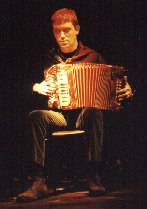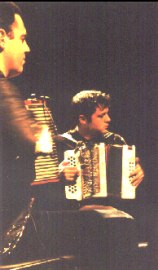FolkWorld article by Christian
Moll :
Dancing Accordeons
Danças Ocultas - exciting sounds from Portugal
 I
had the great pleasure to attend the Portugal special evening at the 2nd Tilburg
(Netherlands) International Folk Festival in January 2001. Highlight of the
evening for me was a band that was announced in the programme with the following
line up: 4 Concertinas. Danças Ocultas are a very special band - their
music is breathtaking, they play with lots of passion...
I
had the great pleasure to attend the Portugal special evening at the 2nd Tilburg
(Netherlands) International Folk Festival in January 2001. Highlight of the
evening for me was a band that was announced in the programme with the following
line up: 4 Concertinas. Danças Ocultas are a very special band - their
music is breathtaking, they play with lots of passion...
As I entered the hall to see Danças Ocultas, I saw that they are not
a aband with four concertinas, but with four diatonic accordions. Artur Fernandes,
leader of the band states "I don't know why, but in Portugal the diatonic accordion
has the wrong name 'Concertina'!" As we now know why they are sometimes announced
as four concertinas, we can go further to exploit more of their music.
Artur describes: " We make a new music to an old instrument. The diatonic accordion
has some limitations, however, we try not to worry about the limitations, but
we are using the capabilities. On the other hand, all of the family of accordions
is associated with virtuous soloist players; we prefer to explore the expressive
side of the instrument and therefore communicate through collective emotion."
And collective emotion can be felt when you see them playing - their shows are
so full of emotion. Their musical interaction is very strong.
"We play by heart, in order to privilegiate the collective emotion, trying
to promote the visual contact displaying the four chairs in a half-circle in
the center of the stage. Because of this, there is a kind of complicity that
provokes a special empathy between the audiance and the musicians. To make this
work we, like better playing in concert rooms and auditoriums..."
 In
the accordion quartett the four musicians have all their individual part. "As
far as the instrument allows, we have now a more specified musical functions
for each of the members. In early days of the band we have had a rotational
role. Filipe Ricardo plays mostly the bass, Filipe Cal the harmony, Francisco
Miguel the melodic counterpoint and I play melodic lines."
In
the accordion quartett the four musicians have all their individual part. "As
far as the instrument allows, we have now a more specified musical functions
for each of the members. In early days of the band we have had a rotational
role. Filipe Ricardo plays mostly the bass, Filipe Cal the harmony, Francisco
Miguel the melodic counterpoint and I play melodic lines."
And not only in the way of arranging the material they have develloped during
the time. In the beginning they played quite a lot of traditional music. On
their first album ("Danças Ocultas", '96) you can find traditional music
and tunes composed by Bitocas (their sound technician) and by Artur; on their
second CD ("Ar", '98) you can find self composed material by all of the band
members.
All of them first played music in folkloric dance music groups, later they
all had classical music education (Sax, Cello and Composition). Artur started
playing diatonic accordion following a family tradition, but he did not learn
it the 'traditional way' - "I didn't learn playing this instrument hearing and
seeing other players, as it is usual in my country, but instead I had classical
musical education and studied it by music. Very early in my life, I started
teaching music in '89. I decided to join and form the band "Dancas Ocultas"
with my first three pupils."
"The band 'Danças Ocultas' started in '89 when giving collective lessons
and playing transcriptions of classical partitions - Aida overture (Verdi),
Air from the G string (Bach) - and other countries' folk music - Italy, Brazil...
When I went to study classical composition, my university teacher advised me
to compose for a diatonic accordion quartet. So I started composing to the band
getting out of the instrument's folkloric tradition and tried to look for the
natural wills of the instrument. In '93 Gabriel Gomes, Madredeus' accordionist
heard our work and showed interest in producing our first album, what he did,
we recorded it in '94 and it was published in '96 by EMI Portugal."
When they are playing in Portugal, this is more in the center and the south
- in Artur's opinion this is because this regions are promoting more cultural
events, and the North maybe has a more conservative attitude with the diatonic
accordion. Dan&ccedol,as Ocultas have played since '97 in Spain, Italy, France,
Netherlands, Belgium and Morocco (tours and isolated concerts). "Most of our
audiance is between 20 and 40, going to attend diverse cultural events and having
a curiosity to see new things."
The band members have other projects besides this band. Artur: "Francisco Miguel
goes on collaborating with folkloric dancing groups, Filipe Cal and Filipe Ricardo
are members of "Tunas" (University bands) and I also play in another musical
project called "4Portango" vocationeted to play Piazzolla Tangos with some Portuguese
accent. We are frequently invited to play in concerts and make recordings. I
myself compose music to theatre, dance and cinema and at the same time I develop
a pedagogic activity shared between the teaching of the instrument and the teaching
of composition."
The diatonic accordion (known in Portugal as concertina) was nearly disappearing
some years ago. "At the time I started playing diatonic accordion it was just
disappearing - not only in our region (Centre West), but also in the rest of
the country. Nowadays, we are having a rebirth of this instrument and we can
say that it is its strongest moment ever - both quantity and quality of players.
But this movement, excluding "Dancas Ocultas" is circumscribed to a conservative
attitude in the folkloric field."
In Portugal the roots related music scene is getting stronger - but (as in
so many other countries) the media attention is missing at the moment. "The
traditional Portuguese music is alive due to a musician generation that comes
from the political intervention music of the 70's close to the traditional roots.
These musicians used to play several musical styles (Jazz, Pop, and Rock among
others), they joined bands and by the early 90's they revisited the Portuguese
traditional music in a revival movement against the Anglo-Saxon dominant musical
influence. It's in this context that new bands and voices appear like Madredeus,
Dulce Pontes, Camane, Paulo Braganca, Gaiteiros de Lisboa, Frei Fado d'el Rei,
Amelia Muge, among others. In this line, a lot of urban young people began to
show interest in traditional instruments which were getting old fashioned (diatonic
accordion, "gaita-de-fole (bagpipe), "Sanfona" (Hurdy-gurdy), "cavaquinho" a
little chord instrument like the Hawaiian ukulele). But this recent movement
hasn't had a better exposition due to the mercantilist options of the music
editors and consequently of the mass media. The movement is increasing just
with the opportunity of playing together in a few traditional dance and music
festivals."
Still, hopfully the music scene gets stronger and we - as inhabitants of other
parts of Europe (and the world) - are getting in future more often to exploit
interesting music from Portugal. For example Danças Ocultas are well
worth to see and hear. And if you are organising a folk music event - get in
contact with them to present your audience one of the hottest accordion quartetts
in the world...
Further infos/contact: e-mail Ana Paula
@ O Acaso.
Photo Credit: All photos by The Mollis, taken at Tilburg International
Folk Festival in January 2001
Back to the content of FolkWorld Articles, Live Reviews & Columns
To the content of FolkWorld
online magazine Nr. 19
© The Mollis - Editors
of FolkWorld; Published 8/2001
All material published in FolkWorld is © The Author via FolkWorld. Storage for private use is allowed and welcome. Reviews and extracts of up to 200 words may be freely quoted and reproduced, if source and author are acknowledged. For any other reproduction please ask the Editors for permission.
FolkWorld - Home of European Music

Layout & Idea of FolkWorld © The Mollis - Editors of FolkWorld
 I
had the great pleasure to attend the Portugal special evening at the 2nd Tilburg
(Netherlands) International Folk Festival in January 2001. Highlight of the
evening for me was a band that was announced in the programme with the following
line up: 4 Concertinas. Danças Ocultas are a very special band - their
music is breathtaking, they play with lots of passion...
I
had the great pleasure to attend the Portugal special evening at the 2nd Tilburg
(Netherlands) International Folk Festival in January 2001. Highlight of the
evening for me was a band that was announced in the programme with the following
line up: 4 Concertinas. Danças Ocultas are a very special band - their
music is breathtaking, they play with lots of passion... In
the accordion quartett the four musicians have all their individual part. "As
far as the instrument allows, we have now a more specified musical functions
for each of the members. In early days of the band we have had a rotational
role. Filipe Ricardo plays mostly the bass, Filipe Cal the harmony, Francisco
Miguel the melodic counterpoint and I play melodic lines."
In
the accordion quartett the four musicians have all their individual part. "As
far as the instrument allows, we have now a more specified musical functions
for each of the members. In early days of the band we have had a rotational
role. Filipe Ricardo plays mostly the bass, Filipe Cal the harmony, Francisco
Miguel the melodic counterpoint and I play melodic lines."